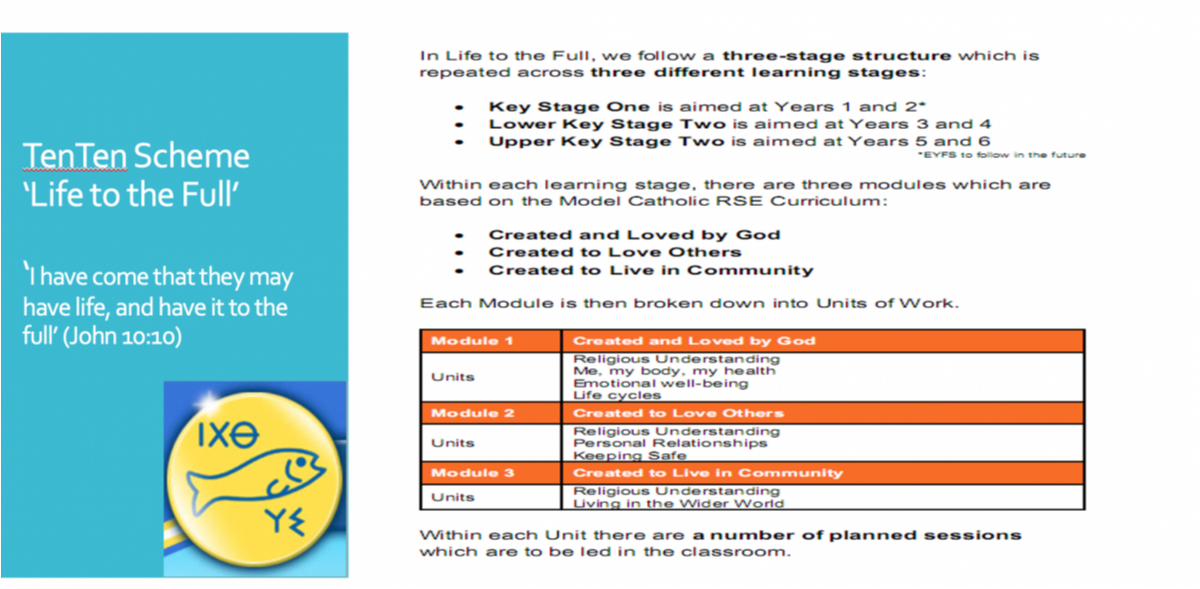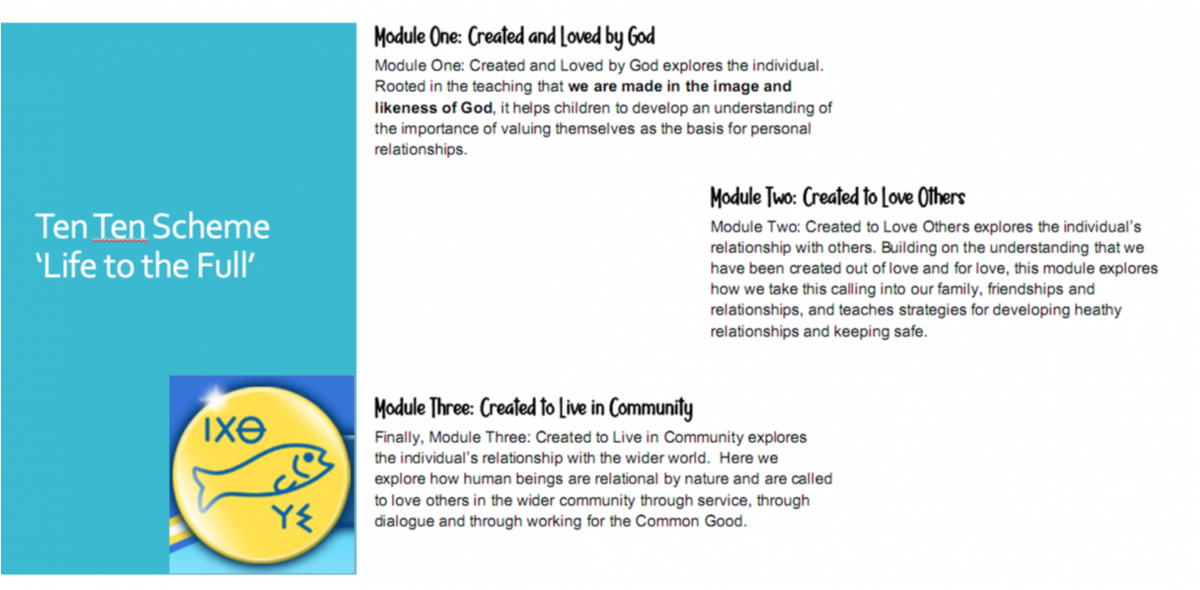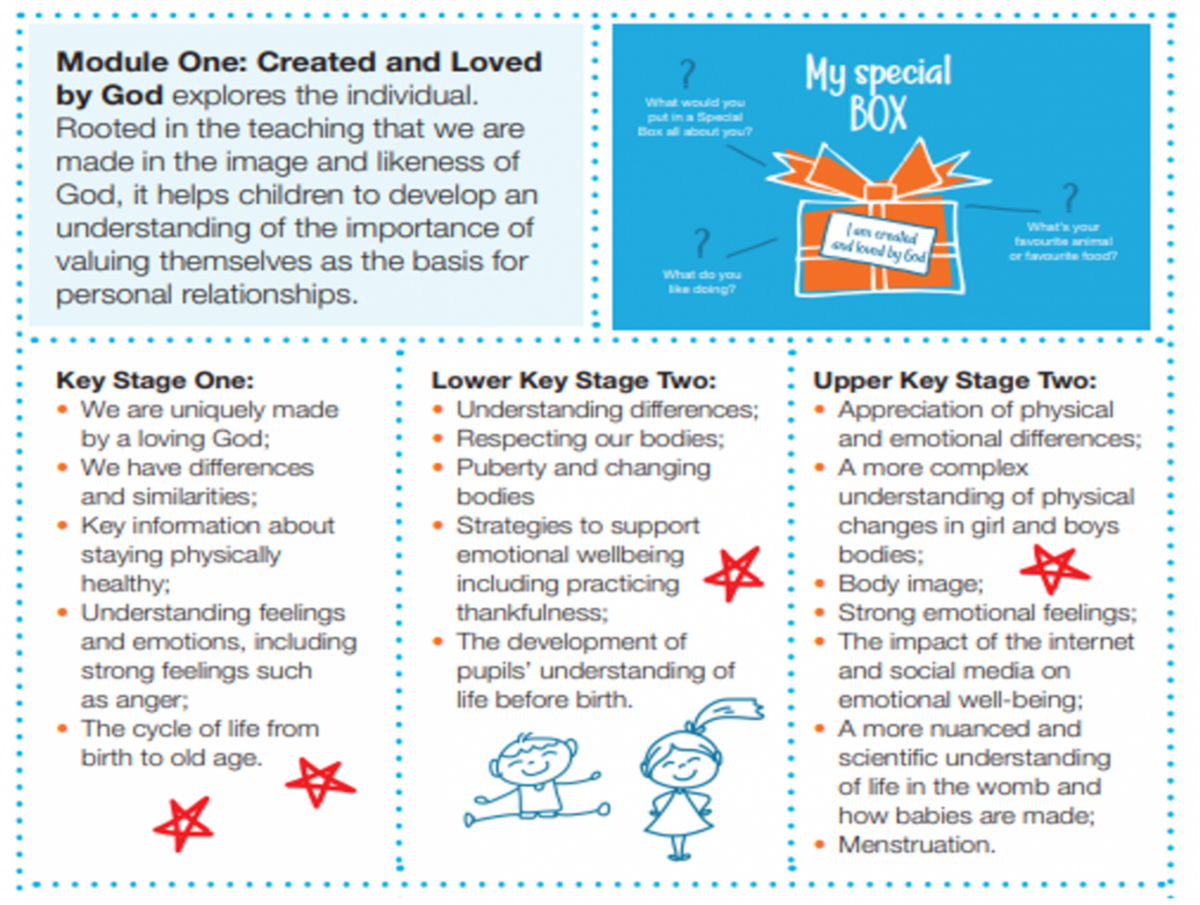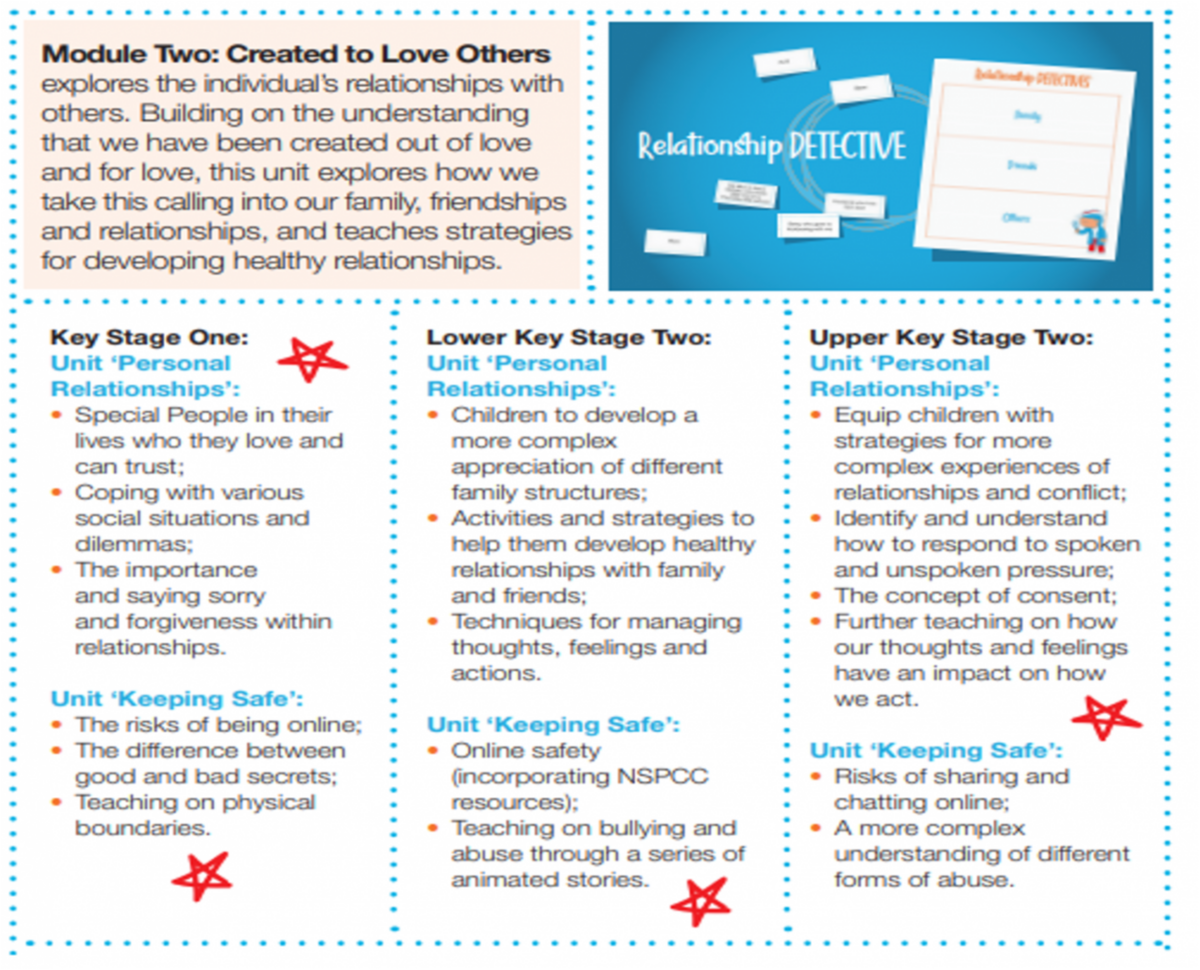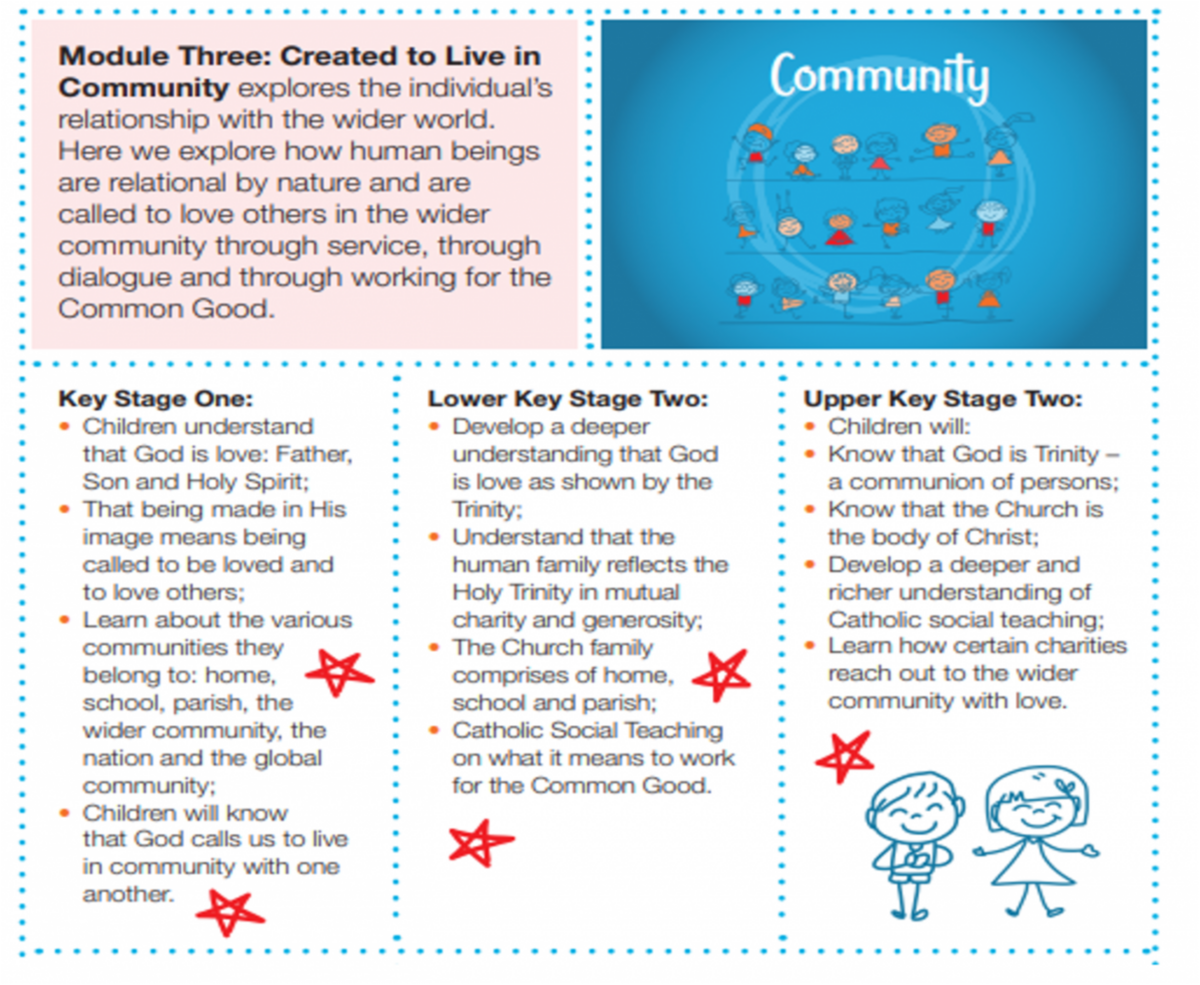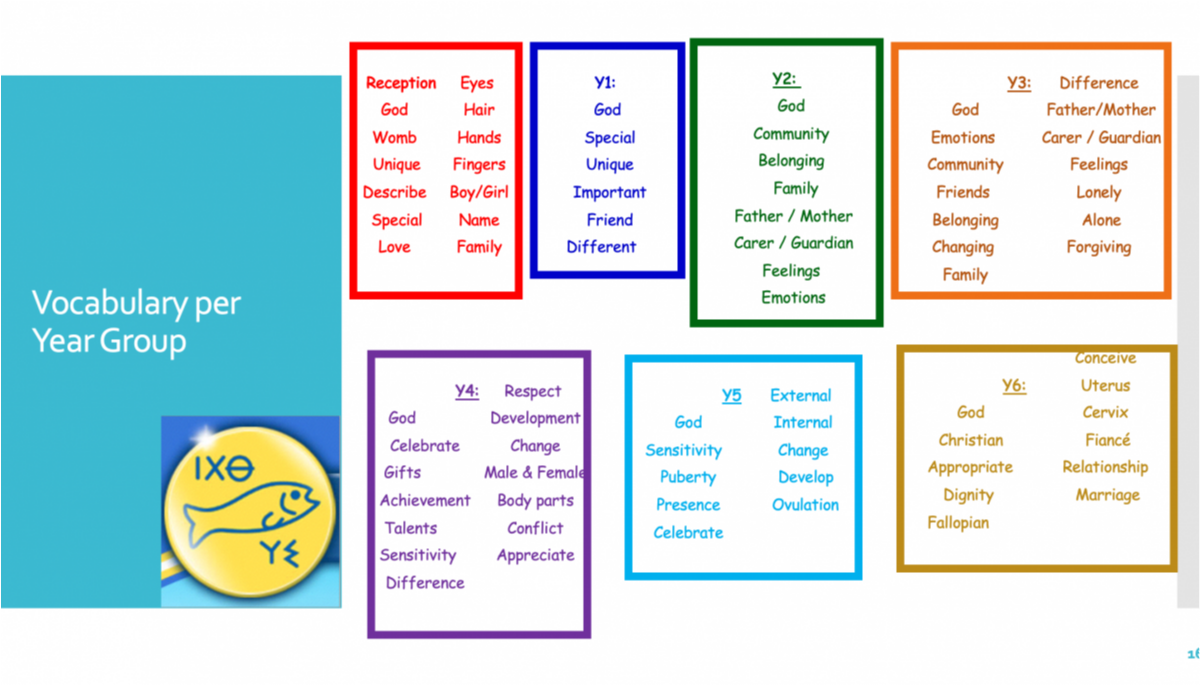RSE Curriculum Intent Statement
At Our Lady & St Joseph School, our Mission Statement commits us to foster the Gospel values of Jesus Christ and provide a high standard of education with equality of opportunity for all. Furthermore, our school aims state that we will endeavour to raise pupils’ self-esteem, help them to grow spiritually, intellectually, emotionally and physically, recognise the value of everyone in our community and develop caring and sensitive attitudes. It is in this context that we commit ourselves: In partnership with parents, to provide children and young people with a “positive and prudent sexual education” which is compatible with their physical, cognitive, psychological, and spiritual maturity, and rooted in a Catholic vision of education and the human person.
The DFE guidance defines RSE as “lifelong learning about physical, moral and emotional development. It is about the understanding of the importance of marriage and family life, stable and loving relationships, respect, love and care. It is also about the teaching of sex, sexuality and sexual health”. It is about the development of the pupil’s knowledge and understanding of themselves as a sexual being, about what it means to be fully human, called to live in right relationships with self and others and being enabled to make moral decisions in conscience. The DFE identifies three main elements:
“attitudes and values, personal and social skills, and knowledge and understanding”.
OLSJ follows the teaching of the Roman Catholic Church, in its daily life through celebration of the Liturgy and through following the values taught in the Gospel of Jesus and our school’s Mission Statement.
Implementation
At OLSJ, we are involved in relationships and sex education precisely because of our Christian beliefs about God and about the human person. The belief in the unique dignity of the human person made in the image and likeness of God underpins the approach to all education in a Catholic school. Our approach to RSE therefore is rooted in the Catholic Church’s teaching of the human person and presented in a positive framework of Christian ideals.
At the heart of the Christian life is the Trinity, Father, Son and Spirit in communion, united in loving relationship and embracing all people and all creation. As a consequence of the Christian belief that we are made in the image and likeness of God, gender and sexuality are seen as God’s gift, reflect God’s beauty, and share in the divine creativity. RSE at OLSJ, therefore, will be placed firmly within the context of relationship as it is there that sexuality grows and develops.
All RSE teaching at OLSJ will be in accordance with the Church’s moral teaching. It will emphasise the central importance of marriage and the family whilst acknowledging that all pupils have a fundamental right to have their life respected whatever household they come from and support will be provided to help pupils deal with different sets of values. RSE will be taught in accordance with the principles set down in other relevant school’s policies such as Equal Opportunities and Inclusion.
Teachers will ensure that all RSE teaching is differentiated. RSE teaching is sensitive to the different needs of individual pupils and is taught in a way that allows access to those pupils at different stages of cognitive and emotional development. Learning and teaching methods will be adapted and specialist resources and training will need to be provided for those with particular needs (through Diocesan training shared by the RSE Co-ordinator). At OLSJ, we will ensure that children with special educational needs and disabilities are not at any point withdrawn because of lack of resources and training or to catch up in other subjects.
We will ensure that RSE teaching at OLSJ is both balanced and cross-curricular. Teaching on relationships and sexuality needs to be reflected in each relevant part of the curriculum. Whilst, for example, some aspects will be more appropriately explored in science lessons and some more appropriately explored in RE lessons, each should be informed by the other. Each discipline should speak with consistency about the meaning of human love and the virtues that are enshrined in the Church’s teaching on human love. Furthermore, whilst promoting Catholic virtues, we will ensure that children and young people are offered a broad and balanced PSHRE programme which provides them with clear factual, scientific information when relevant and meets the statutory requirements placed on schools.
At OLSJ we will use the Ten-Ten Resource ‘Life to the Full’ to deliver the RSE curriculum content within the context of a Christian understanding of human sexuality rooted in the wisdom and teaching of the Catholic Church.
The entire teaching is underpinned with a religious understanding that our deepest identity is as a child of God – created, chosen and loved by God. The programme is fully inclusive of all pupils and their families. Our ‘Life to the Full’ programme will cover:
Module 1: Created and Loved by God
- Religious Understanding
- Me, my body, my health
- Emotional well-being
- Life cycles
The Christian imperative to love self, made in the image and likeness of God, shows an understanding of the importance of valuing and understanding oneself as the basis for personal relationships.
Module 2: Created to Love Others
- Religious Understanding
- Personal Relationships
- Keeping Safe
God is love. We are created out of love and for love. The command to love is the basis of all Christian morality.
Module 3: Created to Live in Community
- Religious Understanding
- Living in the Wider World
Human beings are relational by nature and live in the wider community. Through our exchange with others, our mutual service and through dialogue, we attempt to proclaim and extend the Kingdom of God for the good of individuals and the good of society.
The proposed content of each module for each Key Stage can be found in the Relationship and Education Curriculum Outline Document. For the purposes of this RSE programme the Key Stages are:
- EYFS – Reception
- Key Stage 1 – Year 1 and Year 2
- Lower Key Stage 2 – Year 3 and Year 4
- Upper Key Stage 2 – Year 5 and Year 6
Each theme covers the core strands of ‘Education in Virtue’ and ‘Religious Understanding’ as well as strands which cover the PSHRE content of the theme.
At OLSJ, we recognise that Parents and Carers are the primary educators of their children. As a Catholic school, we provide the principal means by which the Church assists parents and carers in educating their children. Therefore, we will support parents and carers by providing material to be shared with their children at home and workshops to help parents/carers to find out more. Parents/carers will be informed by letter when the more sensitive aspects of RSE will be covered in order that they can be prepared to talk and answer questions about their children’s learning.
Parents have been consulted about the new RSE programme of study and will continue to be consulted at every stage of the development of the RSE programme, as well as during the process of monitoring, review and evaluation. They will be able to view the resources used by the school in the RSE programme (via our school website and access to the Ten-Ten parent portal). Our aim is that every parent and carer will have full confidence in the school’s RSE programme to meet their child’s needs.
We understand that parents have the right to withdraw their children from RSE except in those elements, which are required by the National Curriculum science orders. Should parents wish to withdraw their children they are asked to notify the school by contacting the Head Teacher in writing.
The school will provide support by providing material for parents to help the children with their learning. We believe that the controlled environment of the classroom is the safest place for this curriculum to be followed.
Our school will often call upon help and guidance from outside agencies and health specialists to deliver aspects of RSE. Such visits will always complement the current programme and never substitute or replace teacher led sessions. It is important that any external visitor is clear about their role and responsibility whilst they are in school delivering a session. Any visitor must adhere to our code of practice developed in line with CES guidance ‘Protocol for Visitors to Catholic Schools’. Health professionals will follow the school’s policies, minimising the potential for disclosures or inappropriate comments using negotiated ground rules and distancing techniques as other teachers would. They will ensure that all teaching is rooted in Catholic principles and practice.
Each unit of work has an assessment activity associated with it, this will enable us to track progress of learning across each unit. The assessment activities take into account the Learning Objectives of each session, they are carried out at the beginning and end of each session to show the impact of the teaching and learning.
Impact
Our Mission commits us to foster the Gospel values of Jesus Christ and provide a high standard of education with equality of opportunity for all and we believe that RSE is an integral part of this education. Through regular RSE teaching, we willendeavour to raise pupils’ self-esteem, help them to grow spiritually, intellectually, emotionally and physically, recognise the value of everyone in our community and develop caring and sensitive attitudes.
All staff at OLSJ, in partnership with parents, commit ourselves to provide children and young people with a “positive and prudent sexual education” which is compatible with their physical, cognitive, psychological, and spiritual maturity, and rooted in a Catholic vision of education and the human person.
As a result, children will leave OLSJ meeting the following objectives:
To develop the following attitudes and virtues:
- reverence for the gift of human sexuality and fertility;
- respect for the dignity of every human being – in their own person and in the person of others;
- joy in the goodness of the created world and their own bodily natures;
- responsibility for their own actions and a recognition of the impact of these on others;
- recognising and valuing their own sexual identity and that of others;
- celebrating the gift of life-long, self-giving love;
- recognising the importance of marriage and family life;
- fidelity in relationships.
To develop the following personal and social skills:
- making sound judgements and good choices which have integrity and which are respectful of the individual’s commitments;
- loving and being loved, and the ability to form friendships and loving, stable relationships free from exploitation, abuse and bullying;
- managing emotions within relationships, and when relationships break down, with confidence, sensitivity and dignity;
- managing conflict positively, recognising the value of difference;
- cultivating humility, mercy and compassion, learning to forgive and be forgiven;
- developing self-esteem and confidence, demonstrating self-respect and empathy for others;
- building resilience and the ability to resist unwanted pressures, recognising the influence and impact of the media, internet and peer groups and so developing the ability to assess pressures and respond appropriately;
- being patient, delaying gratification and learning to recognise the appropriate stages in the development of relationships, and how to love chastely;
- assessing risks and managing behaviours in order to minimise the risk to health and personal integrity.
To know and understand:
- the Church’s teaching on relationships and the nature and meaning of sexual love;
- the Church’s teaching on marriage and the importance of marriage and family life;
- the centrality and importance of virtue in guiding human living and loving;
- the physical and psychological changes that accompany puberty;
- the facts about human reproduction, how love is expressed sexually and how sexual love plays an essential and sacred role in procreation;
- how to manage fertility in a way which is compatible with their stage of life, their own values and commitments, including an understanding of the difference between natural family planning and artificial contraception;
- how to keep themselves safe from sexually transmitted infections and how to avoid unintended pregnancy, including where to go for advice.

